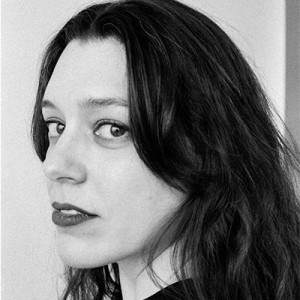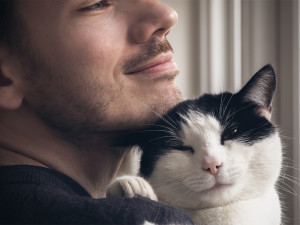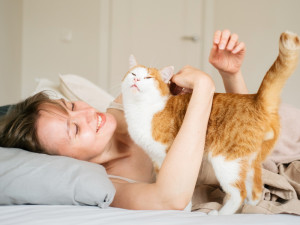How Covid Changed My Relationship with My Cat
The pandemic turned me into a morning person and my cat into a mama’s boy.

Share Article
At some point in late 2020, I became a morning person. I was never a super late riser, but I’m talking boomer dad levels of early, like equating some sort of moral superiority with seeing the sun rise sort of early. Though I’m not totally sure how I came to consider 6 a.m. a normal time to zombie-style rise from my bed, I know that my orange cat Jeff (short for Jeffrey David Craley, named by my husband, Aaron, after our equally orange-haired friend) had something to do with it.
It started with him seemingly sensing that something in me was gaining consciousness; before I’d even opened an eye or moved a muscle, he knew. Suddenly, he’d be sitting on my side of the bed in his signature regal pose, tail curled around his paws, inches away from my face. Then I would feel the pillows on the bottom of his paw settle on my cheek, nose, or mouth ever so gently in an attempt to move the process along. If I opened my eyes to slits while he did this, I saw his paw shaking as it got closer to me, as if the soft gesture required more muscle control than if he were to swipe at me like a mouse. That became the inevitable point at which my day started.

Save on the litter with color-changing tech that helps you better care for your cat.
At around 7:00 a.m., I would give in, get up, and head to the kitchen with Jeff just a few steps behind me as I grumbled while getting out the coffee beans. Then, I realized how calm our apartment was at that time of day. I sat drinking my coffee on the window seat, Jeff curled somewhere at my feet, basking in silence. From there on out, I gradually woke up earlier and earlier until I hit the 6:00 a.m. mark, when the sun was just rising that winter. I’d watch pink streaks creep into the sky as my cat sometimes snored or chased mice in his dreams next to me. If Jeff wasn’t ready to care that I was awake on any particular morning, I would carry him to the living room where he’d keep sleeping on the couch.
Much like the Jewish mothers in my life, all cat owners think their child is the most special one in the world. But Jeff is truly something else (which makes me hesitate about having actual children). He sometimes places a paw on my arm in very we-need-to-talk fashion; he uses the corners of much of our furniture as a neck rest, lying totally flat with his head and paws hanging off the edges because he can’t even. I’ve taught him to sit and stand on his hind legs for his wet food. He seemed kind of thrilled that, when lockdown set in, Aaron and I were at home all the time. I’d often half-joked that Jeff was sexist and liked Aaron better than me, but with our new quiet routine, he became a bit of a mama’s boy. As I woke up earlier and earlier, Aaron started going to bed later, as we both carved out alone time in our quarantine bubble of two, in which we’d otherwise have next to no solo moments. Although I wasn’t quite alone for all those hours.
As the pandemic progressed and the living room turned into my de facto office, Jeff became a very unproductive co-worker: Always waiting for a break in my workflow for a cuddle opportunity, often lying on the chair or couch’s back rest directly behind my neck without me realizing it until I unintentionally lowered my head onto him. Even as I write this, he is curled up on a blanket beside me on the couch, doing a very convincing impression of a croissant, which is distracting to say the least. His perpetual presence became soothing, newly habitual. I wondered if he felt my heightened pandemic-related anxiety and was somehow trying to appease it or if he was just in it for the nap-time pets. But in moments of grief, peaks of stress, or bouts of illness, Jeff was somehow always within arm’s reach.
Over the course of the lockdown, he was also a much-appreciated third roommate for Aaron and I, who, admittedly, spent too much time together because, like everyone else, we had to. He became the center of many of our inside jokes: While dancing in the living room, I discovered that, to Jeff, those physical motions were no different from something threatening, as he meowed at me frantically. It led us to deduce that he hates dancing and I started calling him by the name of the dad in Footloose. He always seemed to be camera-ready and aiming to top his own cuteness, making him perfect fodder for social media content, which for a while felt like our only link to the outside world.
During lockdown, we also crossed a weird milestone meaningful only from a human perspective. In 2020, Jeff turned five years old, which equates to about 36 in human years. Just like that, this little guy we’d adopted from a Montreal cat rescue called Pussy Patrolopens in a new tab was older than us, something I thought about as the days got shorter and we endured wave upon wave of the pandemic. Though it’s something I’ve always known intuitively, being so close to him constantly, I understood for the first time how big his absence will be one day.
I can’t help but wonder what it will feel like when I lean my head back on the couch to use him as a pillow and he won’t be there, when catching the first of the light coming into the sky in my silent home won’t be scored by his occasional snores. I wonder if I’ll still wake up at the crack of dawn when he won’t be just within arm’s reach. Then, I’ll remember what a bright spot for jokes, calm, entertainment, and general warmth he was in a year when everything except his presence on the couch felt out of place.

Caitlin Stall-Paquet
Caitlin Stall-Paquet is a writer and editor who collaborates with Elle Canada, The Walrus, Xtra, and The Globe and Mail. She lives in Montreal with her husband and cat, Jeff. Follow her on Instagram @caitlinstallpopens in a new tab.
Related articles
![cat snuggling man]() opens in a new tab
opens in a new tabWhat’s Your Cat’s Love Language?
Five surprising ways cats show affection (and how you can show it back), according to a cat behaviorist.
![Woman laying on her bed while hugging her cat]() opens in a new tab
opens in a new tabWhy Does My Cat Wake Me Up At the Crack of Dawn?
A cat pawing at your face at 4 a.m. is hard to ignore, but cat behaviorist Cristin Tamburo suggests you try.

